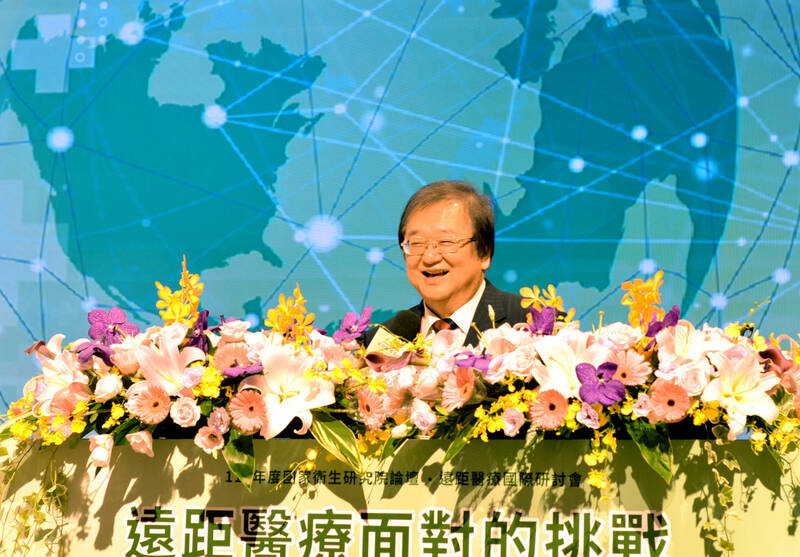Taiwan should learn from other countries to advance telehealth services in the post-COVID-19 pandemic era, Minister of Health and Welfare Chiu Tai-yuan (邱泰源) said yesterday.
Chiu made the remark at a Taipei conference titled the “Current Challenges and Opportunities in Telehealth,” held by the National Health Research Institutes (NHRI) Forum, Taipei Medical University and National Yang Ming Chiao Tung University.
In his opening speech, Chiu discussed the concept of “social prescribing,” encouraging healthcare providers view patients through a professional medical lens and refer them to a range of person-centered non-clinical care services to support their health and well-being.

Photo: CNA
Since becoming the director of a public health center in 1988, Chiu said he began overseeing the operations of telehealth and hospice care.
His experience working with people in hospice care showed him the importance of person-centered care and that patients are connected to the community, he said.
Person-centered care services and telemedicine have played important roles during the COVID-19 pandemic around the world, and in the post-pandemic era, many countries are pushing to advance telehealth services, Chiu said.
While different countries have different opinions on quality, regulations, ethics and privacy regarding telehealth services, it has become a common challenge for many healthcare systems around the world, he said.
Taiwan should continue to learn from and communicate with other countries to advances its telehealth services, he said.
In the post-COVID-19 era, telemedicine still faces challenges, including healthcare quality monitoring, patient privacy safety, regulations and regulatory reviews, but after some experience, the scope of telemedicine was expanded in July, NHRI Forum vice chairman Wayne Sheu (許惠恒) said.
Taipei Medical University Board of Trustees chairman Chen Ray-jade (陳瑞杰) said telemedicine did not disappear after COVID-19 ended, but transformed into telehealth, and is shifting its focus from acute care to chronic care services.
The focus of telehealth is on individuals or families, so if there is a comprehensive telehealth system, people can still receive healthcare at home when a disaster or pandemic occurs, which is an embodiment of a “resilient health system,” Chen said.
However, telemedicine in the post-COVID-19 era faces four main challenges: regulations, payment systems, technology and personal information security, he said.
The conference was held for people from the private and government sectors, academics and healthcare providers to discuss solutions, he said.
Telehealth can also be extended beyond medical treatment, to health education, holistic healthcare and weight management, or even allow people to participate in clinical trials at home, he added.
Additional reporting by CNA

A total lunar eclipse coinciding with the Lantern Festival on March 3 would be Taiwan’s most notable celestial event this year, the Taipei Astronomical Museum said, urging skywatchers not to miss it. There would be four eclipses worldwide this year — two solar eclipses and two lunar eclipses — the museum’s Web site says. Taiwan would be able to observe one of the lunar eclipses in its entirety on March 3. The eclipse would be visible as the moon rises at 5:50pm, already partly shaded by the Earth’s shadow, the museum said. It would peak at about 7:30pm, when the moon would

A New York-based NGO has launched a global initiative to rename the nation’s overseas missions, most of which operate under the name "Taipei," to "Taiwan Representative Office (TRO)," according to a news release. Ming Chiang (江明信), CEO of Hello Taiwan, announced the campaign at a news conference in Berlin on Monday, coinciding with the World Forum held from Monday through Wednesday, the institution stated in the release. Speaking at the event, Democratic Progressive Party Legislator Huang Jie (黃捷) said she believed this renaming campaign would enable the international community to see Taiwan

DEFENSE: The US should cancel the US visas or green cards of relatives of KMT and TPP lawmakers who have been blocking the budget, Grant Newsham said A retired US Marine Corps officer has suggested canceling the US green cards and visas of relatives of opposition Taiwanese lawmakers who have been stalling the review of a proposed NT$1.25 trillion (US$39.7 billion) special defense budget. The Executive Yuan has proposed the budget for major weapons purchases over eight years, from this year to 2033. However, opposition lawmakers have refused to review the proposal, demanding that President William Lai (賴清德) first appear before the Legislative Yuan to answer questions about the proposed budget. On Thursday last week, 37 bipartisan US lawmakers sent a letter to Legislative Speaker Han Kuo-yu (韓國瑜), the heads

TOO DANGEROUS: The families agreed to suspend crewed recovery efforts that could put rescuers in danger from volcanic gases and unstable terrain The bodies of two Taiwanese tourists and a Japanese pilot have been located inside a volcanic crater, Japanese authorities said yesterday, nearly a month after a sightseeing helicopter crashed during a flight over southwestern Japan. Drone footage taken at the site showed three bodies near the wreckage of the aircraft inside a crater on Mount Aso in Kumamoto Prefecture, police and fire officials said. The helicopter went missing on Jan. 20 and was later found on a steep slope inside the Nakadake No. 1 Crater, about 50m below the rim. Authorities said that conditions at the site made survival highly unlikely, and ruled